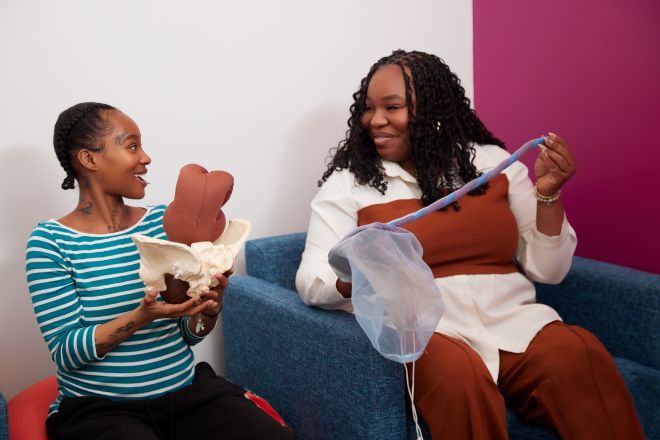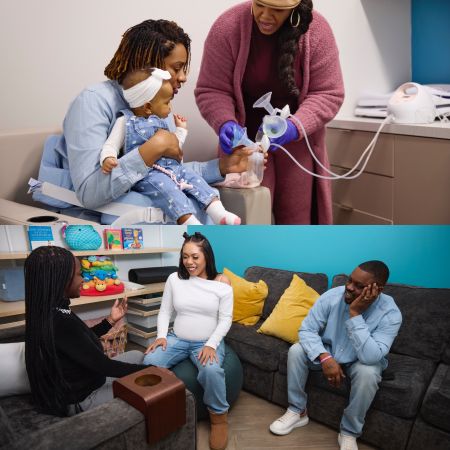Mamatoto Village: Changing The Game For Black Maternal Health
Inside Mamatoto Village: The Black-Led Organization Reshaping Maternal Health

Mamatoto Village, based in Washington, D.C., is a nonprofit organization dedicated to providing safe, inclusive, and empowering holistic care for expectant mothers. From classes centered on pregnancy and childbirth to breastfeeding support and mental health services, Mamatoto Village offers compassionate guidance every step of the way.
Its mission is to equip moms with the knowledge, confidence, and resources they need to nurture their families while also caring for themselves through every twist and turn of the motherhood journey.
RELATED CONTENT: Black Maternal Health Week: Misa Hylton’s Daughter Madison Star Brim on Music, Style, And Saving Black Lives As A Doula [Exclusive]

Awareness And Support Are Key
Now, as we end Black Maternal Health Week (April 11-17), the organization’s vital support is essential as Black mothers confront unprecedented challenges across the country. Black women are three times more likely to die from pregnancy-related complications and face a greater risk of developing reproductive health issues that can hinder their chances of starting a family.
Mariah Barnette, Director of Development & Communications at Mamatoto Village, told MadameNoire that Mamatoto is doing everything in its power to change these stark outcomes in the D.C. area.
“Unfortunately, in D.C., Black women make up 90% of maternal deaths. Although the national numbers are decreasing—and at a high level—it’s not changing for Black women.”

According to the Mayo Clinic, factors such as lack of affordable healthcare, medical bias, and delayed recognition of risks and complications all contribute to the persistently high rates of Black maternal health issues. Studies show that a significant proportion of severe maternal mortality cases are preventable.
As Barnettte pointed out, many healthcare providers often overlook the social determinants that impact negative pregnancy outcomes for Black women. In Ward 7, where the organization is based, many women face food insecurity, making it difficult to properly nourish themselves or their families during pregnancy. Additionally, some lack the family support needed to advocate for their care before, during, and after childbirth.
“We work to help our clients with housing, food, basic needs, mental health, all of those things. A lot of our clients may not have a lot of family support. So what makes Mamatoto Village unique is that once you’re in the village, you’re in the village,” shared Barnette.
RELATED CONTENT: Mompreneurs: Revolutionizing Maternal Health Care With Latham Thomas
One program that stands out at Mamatoto Village is the Mothers Rising Home Visiting Program, which provides participants with a care team to support them throughout their perinatal and postpartum journey. The team includes a care coordinator, a mental health support specialist, and a health and wellness expert who offers nutrition guidance. The program takes a holistic approach, addressing not only medical needs but also environmental factors, helping clients to secure stable housing and food access, all while connecting participants to crucial resources.
In addition to personalized care, Mamatoto Village offers a wide variety of classes and support groups, both for participants and the public. These include Blossoming Bellies, a nutrition and meal prep class; breastfeeding support through the Milk Bar support group and Breastfeeding Basics class; as well as Childbirth Basics, Newborn Care, and Preparing for Multiples. The nonprofit has also introduced a Formula Feeding program to support families who are not breastfeeding.
“We have a lot of clients who stay past the end of the program, [and] they come to us to get support in multiple ways. I think a lot of our staff kind of tends to morph into aunties, if you will,” Barnette chuckled. “We want to move them to action and not scare people out of having beautiful births. Because beautiful birth experiences exist. So, we don’t just focus on the pregnancy, but the whole person, and we really address all social determinants of health that can affect someone’s experience.”
Mamatoto Village hit a huge milestone earlier this month when the organization achieved its capital campaign goal, raising $2 million to officially own its current building. The opportunity will allow them to continue providing radical care to community members and new programs like their forthcoming Midwifery school and birth center, which “would be the only birth center east of the river,” said Barnette.
Everyone’s Welcome At Mamatoto Village
All mothers are welcomed at Mamatoto Village, whether they are uninsured or not.
To participate in the Mothers Rising Home Visiting Program, clients who are Medicaid-eligible can enroll through their insurance to receive full program benefits. However, those who are not looking to join the program but still want community doula care can pay out of pocket. Most classes, such as childbirth basics and breastfeeding support, are open to the public, and anyone can join support groups as well.
Those experiencing financial hardship can still participate by speaking with an intake specialist to figure out an action plan.
“We can work with them, we try not to turn anyone away,” Barnette said.
RELATED CONTENT: Why Black Mothers In Low-Income Neighborhoods Have Higher Risks Of Heart Disease







